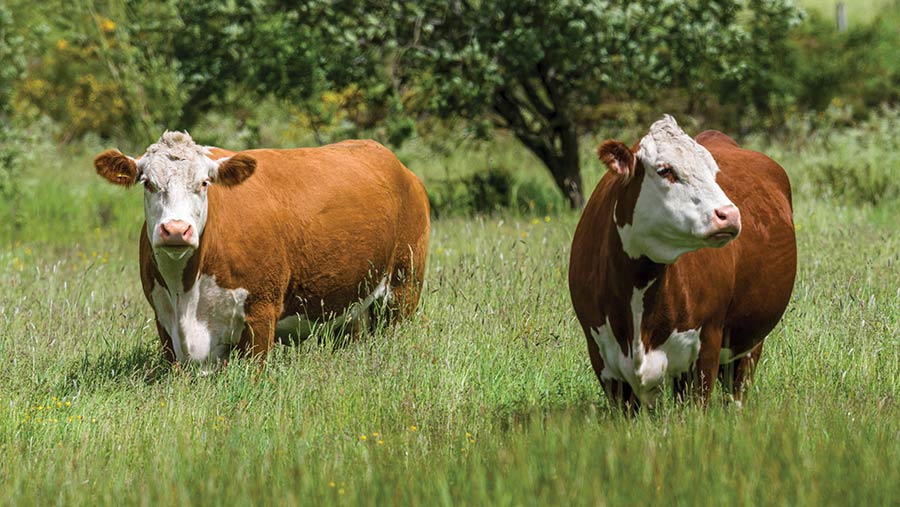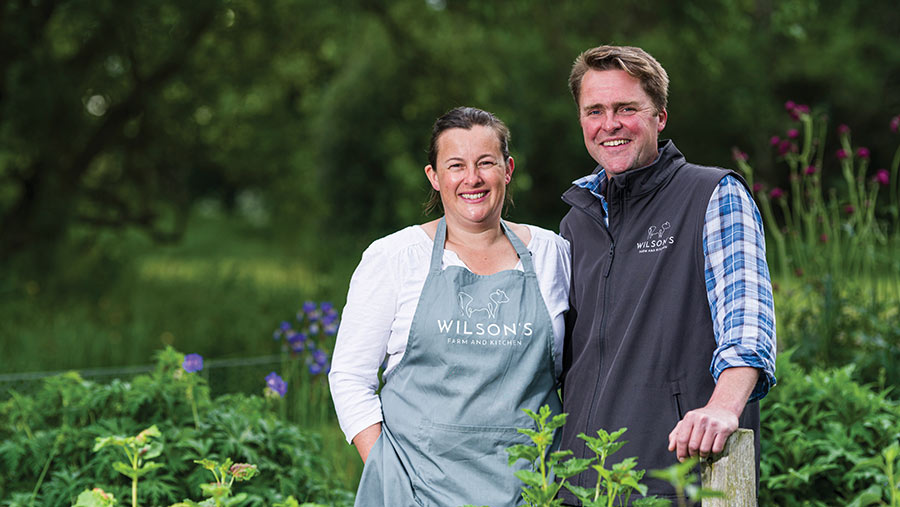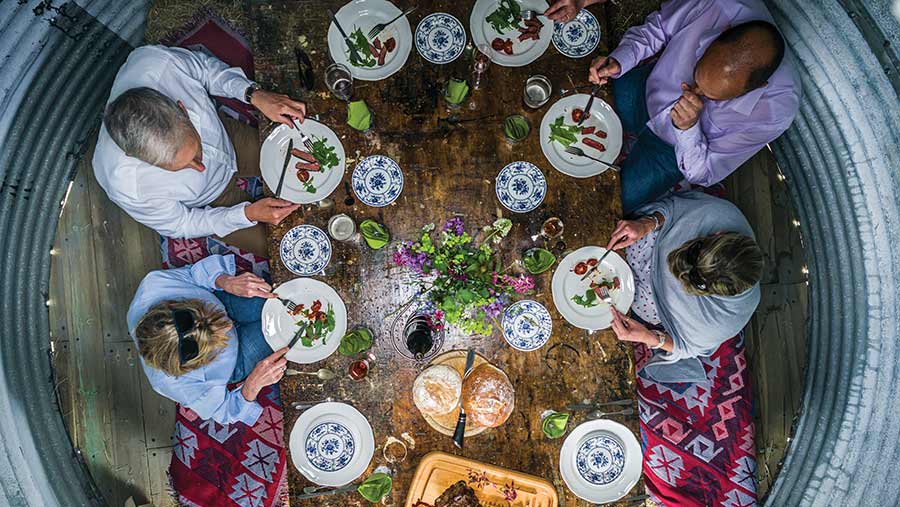Why a mixed farm’s focus is on local food for local people
 © Craig Stephen
© Craig Stephen A mixed, tenanted farm in the Scottish Borders is using agritourism to help create a more resilient business and promote local food to the local community.
The first idea for diversification came about in 2016 for Robert Wilson, who farms with his wife, Lucy, and parents, Ron and Joan, at Cowbog Farm, Morebattle.
They were considering how best to secure their future in the light of Brexit and imminent changes to their leasing arrangements.
What they set up then has since taken a new direction, but food remains the key ingredient.
See also: 4 farmers outline bale grazing benefits in field lab trial
“We used funds from a good sale of cattle, and a Leader grant, to upgrade an old stable block for corporate events and farm-based activities,” says Robert, who runs a suckler herd of 100 pedigree Herefords, alongside a range of arable and forage crops.
“We targeted office groups – we’re one hour from Edinburgh, one hour from Newcastle and one hour from Carlisle – and offered them activities in the morning, lunch, then team bonding in the afternoon.
“We winged it a bit – as farmers, we’re fairly adaptable – and it worked well, but it wasn’t returning enough [money] on the time it took, like so many diversifications people do.”

Lucy and Robert Wilson © Craig Stephen
While all the feedback they received was positive, the standout message was that the lunches were “exceptional” and the highlight of everyone’s day.
This was down to Lucy, who had started cooking privately in people’s homes and catering for outside events – and still does.
Then the Covid-19 pandemic struck and group bookings for the stable block disappeared overnight. Lucy adapted by preparing meals for collection and, as restrictions eased, she began running curry nights.
Three redundant grain silos were repurposed into sheltered seating areas (known as “wee bothies”), each for up to eight people, to cater for family “bubbles”.
Advice and support
“With any project, at the three-year mark, you have to decide where you’re taking it. For us, Covid came along at that point,” says Robert.
They joined weekly support meetings run by Scottish Agritourism during the lockdowns.
This gave them the opportunity to compare notes with others facing the same issues and develop their thinking about the future direction of their diversification.
The result was a rebrand: Wilson’s Farm and Kitchen, with a clear focus on local food for local people.

Sitting down to eat in one of the wee bothies © Craig Stephen
The family now run regular pop-up restaurant nights in the stable block, offering a set menu of mainly sharing dishes for up to 30 people, seated at a long table. Booking is all online and customers pay in advance.
The aim is to develop an alternative market for the farm’s produce and champion other local producers.
Many events involve a farm tour, where guests can learn where their food comes from, as well as get a flavour of the farm enterprises.
Alongside Hereford beef, the farm produces lamb, supplied by Robert and Lucy’s 11-year-old son Henry, and vegetables from a polytunnel and their kitchen garden.
“We also work with a neighbour rearing Oxford Sandy and Black pigs, local bread companies, and the farmer who rents our land for growing broccoli also grows blueberries.
“Then there are tomatoes and other soft fruit, and there’s any amount of game about,” says Robert.
Farm facts: Cowbog Farm, Morebattle
- 243ha mixed farm on light land
- Part secure tenancy, part limited-duration tenancy, part contract farmed
- 100 pedigree Hereford suckler cows, plus followers
- Sales of breeding bulls; other stock sold as stores or finished on-farm
- Permanent pasture and vetch/triticale/barley for arable silage
- Malting barley, winter feed barley, wheat
- 12ha rented out for broccoli production
- One of nine Scottish Monitor Farms
Balance
As a result of the changes to their agritourism diversification, there is less pressure on Robert, leaving him more time to focus on the farm.
Yet he says they are still time-poor: the issue is more a “work-work” balance between the farm and the agritourism, than a work-life balance.
“We could push the agritourism to be more successful, but there would be a cost to that.
“We set it up so that we are largely in control of how many days and events we run, and we can shut off a weekend if we want to. We still have a youngish family to look after.”
Rising prices of ingredients such as butter and olive oil have dented margins, but Robert is confident they will “ride that storm”, and bookings have remained strong.
“There’s no doubt some people think we’re too expensive, until they come, and then they think we’re good value for money – that’s what they tell us.
“Even a bad meal is now expensive. We haven’t put up our prices much, because we’re still a young business and we don’t want to scare people off.”
Robert Wilson’s top tips for an agritourism diversification
- Farm life seems mundane to farmers, but it is very interesting to the general public, so do not be afraid to show them. You only need to look on social media to see how interested they are. People really want to see where, and how, their food is produced
- Examine your skill set
- Take advice. People running agritourism businesses are really willing to share what they are doing. Do not try to do it all yourself
Future plans
Cowbog Farm is one of nine farms in the Monitor Farm Scotland initiative.
Through this, the Wilsons are keen to explore ways to feel more secure about the future and achieve a work-life balance.
As well as developing the agritourism at a manageable pace, the suckler herd is transitioning from a mix of pedigree Herefords and commercial cows to all Herefords, for ease of management.
The calving period for the suckler herd is being consolidated in spring so that more cows can be outwintered, saving the Wilsons time and cost.
And some of the permanent pasture is being renewed, so more can be rotationally grazed rather than set-stocked, improving productivity.
A new round of agritourism Monitor Farms in Scotland is about to be announced, and while Cowbog Farm is not among them, the Wilsons hope to be involved so they can bounce ideas off others to help direct growth.
“Lucy is already using a percentage of our beef for catering, and we’d like to use more of it.
“It’s very doubtful we’d go down the accommodation route: it would be a natural fit for people to stay after a meal, but there are enough people round here offering that.
“We’d like to tie in with other farms that would like to do tours, but don’t have catering facilities. Lucy caters for the odd wedding, so that might be another route to market for some of our produce.”
